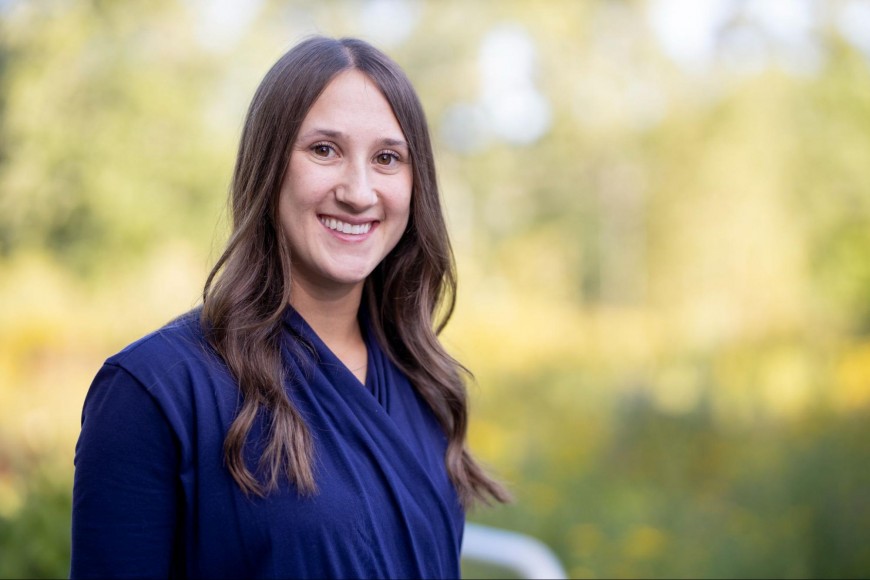
 back to all news
back to all news
Meet the Future of Sustainable Systems: Adrienne Watts (MS ’22)

Why SEAS?
Adrienne Watts (MS ’22) had a few years of work experience under her belt when she came to realize that the way we produce and consume products is antiquated. She learned about the concept of a circular economy, a systemic approach to economic development that’s designed to benefit businesses, society, and the environment, and became excited by the prospect of dedicating herself to creating a more circular world by creating products that could benefit every aspect of society.
With the circular economy and the intersection of consumer goods and sustainability as her core interest, Watts came to SEAS to specialize in Sustainable Systems. “The skills taught in Sustainable Systems, like Life Cycle Assessment and energy system analysis, were hard skills to learn. I needed to technically understand sustainability rooted in science through a systems change perspective,” said Watts.
She learned these skills in a variety of ways. For her culminating capstone project, Watts worked with her project team to focus on Pre-Competitive Collaboration, a systems change approach to address global challenges through the power of business collaboration. The project examines the benefits of the approach, explores the process of enacting systems change, and outlines action steps for business leaders to transform their organization in service of the world and to create purpose-driven movement across industries. When reflecting on the group project, Watts said, “I could have easily taken a project that focused on developing my technical skills, but I am so grateful I stepped out of my comfort zone to focus on a more ambiguous topic. This project broadened my perception of what sustainability means and how it can be achieved.”
Watts also had the opportunity to work on researching plastic waste reduction investment opportunities through the Center for Sustainable Systems. This involved creating the Plastics Waste Reduction Innovation Sustainability Evaluation Tool, which provides investors with a decision-making framework for assessing innovations such as alternative materials to innovative packaging designs, mostly focused on environmental impact.
What’s next?
Watts will be moving to Portland, Oregon, to start a career in operations at Nike, where she is excited about creating tangible impact through her work. “One reason I am excited to join Nike is that through my internship I sensed that bringing sustainability into decision making is encouraged there; Nike is a company that is focused on innovating for the future, with sustainability as a part of that equation. I’m also excited at the possibility of working on a circularity project and helping to close the loop in a notoriously tricky industry,” said Watts.
During her time at SEAS, Watts said that she learned not to just look for jobs with “sustainability” in the title, but that all jobs can have a focus on sustainability. “Oftentimes, the roles that can create the most impact are more functional focused and have decision-making power. I have learned that we can bring a lens of sustainability into any job, and companies or organizations where sustainability is integrated across the organization are the most likely to be sustainability game-changers,” said Watts.
Reflecting on the experience of attending SEAS
It can be hard to choose a favorite class, but Watts says that hers has to be Shelie Miller’s Environmental Systems Analysis course. She says this class gave her the language and mental models to better describe sustainability through a mathematical lens, adding, “Although I spent countless hours on homework, the knowledge I gained impacted the way I think about sustainability today.” Watts also loved Greg Keoleian’s Industrial Ecology and Advanced Life Cycle Analysis class. She said, “Heading into a career with consumer-facing products, I am so thankful for the systemic mindset I developed in those classes and how to understand the trade-offs of different types of goods.”
Many lessons were learned while Watts pursued her master’s degree at SEAS, but she said that one thing, in particular, has made a huge impact on her. “When I came back to school, I was certain that we must design sustainable systems around people to reach a more sustainable world. The most important thing I learned at SEAS is that systems are inevitably made up of people, and to truly pivot to a sustainable world, we must focus on people at the center of a sustainable transition,” said Watts.

